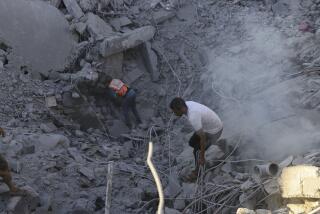Israel Is Warned Again About Seizing Land : Mideast: Palestinians say talks on West Bank’s future depend on halt to planned confiscation of territory in Jerusalem.
- Share via
JERUSALEM — Palestinians issued fresh warnings Sunday to Israel that it must cancel its confiscation of Arab-owned land in Jerusalem if it expects to continue negotiations on the future of the West Bank.
Faisal Husseini, who is a minister without portfolio responsible for Jerusalem in the self-governing Palestinian Authority, warned that the region might be engulfed in violence if the confiscation is carried out.
His comments provoked an angry response from across the Israeli political spectrum, with politicians accusing him of incitement. Some right-wing lawmakers called for Husseini to be prosecuted, or even deported.
But Husseini’s comments seemed to reflect an anger among Arabs that has only intensified since the United States vetoed a U.N. Security Council resolution last week that would have condemned the land confiscation.
For the first time, the mainstream Fatah faction of the Palestine Liberation Organization said Sunday that the Palestinian Authority should abandon its negotiations with Israel if the confiscation goes through. Fatah, founded by Palestinian Authority leader Yasser Arafat, is the most powerful PLO faction.
“Israel assassinated the whole process by confiscating land in East Jerusalem on the way to Judaizing it,” Fatah said in a leaflet distributed in the Gaza Strip and West Bank.
In Jordan, an envoy of Morocco’s King Hassan II said that nine Arab states will hold a mini-summit Saturday to discuss the confiscation issue. The Palestinian Authority has asked Arab states to slow or cancel their normalization efforts with Israel if the Israelis carry out the confiscation, and the Authority plans to put that request to the summit participants.
Israeli officials have repeatedly tried to downplay the significance of the expropriation of 131 acres of land--much of it Arab-owned--to build Jewish housing. Officials here said they had thought the issue would die after the United States cast its Security Council veto.
But Husseini warned bitterly that such confidence is unjustified.
“If the Jerusalem land confiscation is not annulled, an intifada will break out not only in Palestine but all over the Middle East,” he told Israel Radio. The intifada was the violent uprising by Palestinians living in the West Bank and Gaza Strip against Israel’s military occupation.
“Husseini’s statement does not help peace,” Health Minister Ephraim Sneh snapped after Husseini’s comments were broadcast.
Even as the angry exchanges took place, however, there were some signs of ongoing cooperation between the two sides.
Arafat spokesman Nabil abu Rudaineh issued a statement Sunday afternoon rejecting Fatah’s demand for a suspension of negotiations with Israel. He said the decision to make peace with Israel was made by the Palestinian National Council--which functioned as a quasi-parliament in exile before the PLO signed its 1993 peace accord with Israel--and that only it can suspend or reverse that decision.
And in the West Bank, after touring the troubled town of Hebron, Israeli Environment Minister Yossi Sarid and Police Minister Moshe Shahal announced steps Sunday to ease the situation there.
Since a Jewish settler, Baruch Goldstein, killed about 30 Muslim worshipers in Hebron’s Cave of the Patriarchs on Feb. 25, 1994, the city has become a virtual armed camp of Israeli soldiers protecting militant settlers who live in several downtown enclaves.
Hebron officials have complained for months that daily life for the city’s majority Palestinian residents has been rendered unlivable by the army’s severe security measures. The downtown vegetable market is closed; there are military checkpoints scattered across the city, and Palestinians have been subjected to lengthy night curfews.
For the first time, Israelis on Sunday paid compensation for closing the market.
The Israeli ministers handed Hebron’s mayor a check for about $210,000 for losses incurred as a result of the closure. The Israelis also promised to invest hundreds of thousands of dollars in water, sewage and infrastructure projects in Hebron in the coming months.
More to Read
Sign up for Essential California
The most important California stories and recommendations in your inbox every morning.
You may occasionally receive promotional content from the Los Angeles Times.










